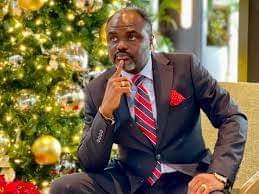I do not deliberately seek out what Pastor Abel Damina says about Christianity. However, due to the nature of social media, his statements often appear in my feed. Damina is regarded by some as a revolutionary Christian because of his initial rebellion against his fellow pastors – pastors who, if not for the Catholic Church, might have succeeded in destroying Christianity in Nigeria. As Bishop Godfrey Onah has convincingly argued, prosperity preachers are primarily the architects of this bruised version of Christianity. Let it be noted, however, that some Catholic priests are not exempt from this destruction – a point some of us have consistently emphasised. Nevertheless, the Catholic Church, with its structured checks and adherence to orthodoxy, stands as a bulwark against the chaotic heterodoxy of Pentecostalism, which remains a miscellany of breeds and creeds.
In his critiques of false doctrines, Damina initially won the applause of many. I remained cautious, even wishing at one point that he would convert to Catholicism, where he could encounter Christianity at its source. Unfortunately, after addressing the doctrinal errors of his fellow pastors – who, like him, are often more deceived than deceiving – Damina turned his focus to the Catholic Church.
He dismissed the Holy Eucharist, the centre and summit of Catholic faith, as “nonsense,” prompting responses from many Catholic priests. True to the ethos of Catholicism, these priests responded with as much love and charity as possible, though occasionally with frustration – akin to a genius addressing the ignorance of an obstinate critic.
One such response came from Fr. John Oluoma, who provided an accurate and comprehensive explanation of Catholic doctrine on the Holy Communion. In reply, Damina, seemingly out of his wits, resorted to attacking priests, calling them immoral in his usual abusive language. To highlight his confusion, he criticised Fr. Oluoma for not quoting “enough scripture” while addressing the subject.
What do I make of these exchanges? Damina’s approach reflects a mind frequently found among heretics: passionate but narrow, emotional rather than objective. His strength in action stems from the narrowness of his thinking, which limits his capacity for genuine dialogue. In contrast, Fr. Oluoma engaged with him as a patient teacher would with an uninformed student. Oluoma displayed perseverance, clarity, and a profound ability to address even complex theological issues with simplicity and depth.
He approached the matter with love for truth and a determination to illuminate it. However, like all heretics, Damina’s mind appears made up, impervious to reason or persuasion.
It is challenging to engage with individuals like Damina because they reject evidence and reason. How does one defend the Eucharist when its biblical basis is plain?
How does one explain sacramental confession or the distinction between mortal and venial sins, all of which are scripturally evident? For Damina, only an abundance of biblical citations seems to matter, yet even these fail to sway him. He is living proof that memorising and quoting the Bible does not equate to understanding it.
Mistaking biblical quotations for spiritual erudition, Damina even claims that Catholics do not read the Bible. Such claims are baseless. Every Catholic Mass, from start to finish, is deeply rooted in Scripture. Catholics celebrate daily Masses, and the liturgical readings are structured to cover the entire Bible over three years. What other church is so beautifully organised?
Ironically, many practices Damina upholds are legacies of the Catholic Church. For example, the replacement of Saturday with Sunday as the day of worship, the tax-exempt status of churches, the use of the Gregorian calendar, the cross as a symbol of Christianity, and the celebrations of Christmas and Easter are all legacies of Catholicism, rooted in both Scripture and tradition.
Why does he despise the Catholic Church yet cling to its legacies? When he embarks on pilgrimages to Jerusalem, he will find that over 98% of the holy sites he visits are under Catholic custody.
He criticises unfaithful priests, but what about the thousands of priests who faithfully uphold their vows of celibacy? Moreover, unfaithfulness is not unique to the clergy; even married pastors and men face the concupiscence of the flesh. Damina knows this.
His confusion underscores a broader issue in Christianity: disagreements over biblical interpretation. Where should one turn in such cases? This reminds me of the debate between Reno Omokri and Fr. Kelvin Ugwu over John 1:1. Anyone who followed it would see that Catholic priests are unmatched in scriptural exegesis.
Ignorant critics like Reno may not realise that Catholic priests are rigorously trained not only in Latin but also in Greek, biblical exegesis, theology, and even the study of other religions, such as Islam. They speak with authority, backed by centuries of tradition and scholarship.
For the umpteenth time, and may it reach Damina’s ears: the Catholic Church gave the Bible to the world. It is her property, and only a fool would think he can fight the owner over her own treasure. Personally, I can listen to other religious groups, but when it comes to Christianity, I cannot listen to anyone other than the Catholic Church. She is the sole authority here – the central sea, while others are mere tributaries.

